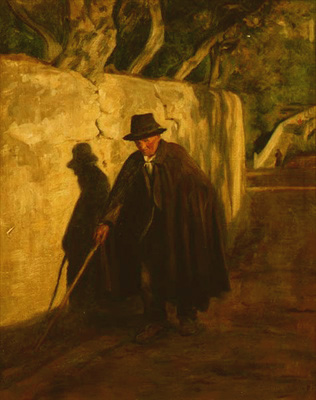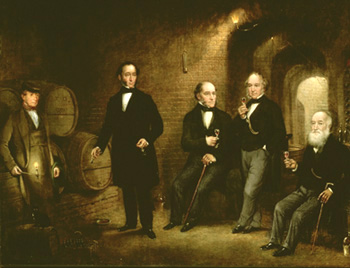 |
Catholic Virtues
Series on Purity – Part IV
Why Impurity Leads to a Materialist Spirit
Plinio Corrêa de Oliveira
We have seen that the Catholic Church recommends to those who do not marry to maintain virginity and perfect chastity. This counsel applies not only to priests, but also – and this is my point in this series – to lay people living in the world, like you and me.
Why does the Church recommend this? Why is this state nobler?

The blind man is deprived of knowledge of the external reality |
As you know, man has five senses. St. Thomas Aquinas teaches us that the criterion to classify the senses is to see how they lead us to knowledge. The more noble a sense is, the more it leads us to a higher level of knowledge. Of our five senses, the most noble is the sight, because it the one that gives us a greater knowledge of the external reality.
We can have an idea of the nobility of the sense of sight by contrast. No one commits suicide when he becomes mute, deaf or loses his smell. There are people, however, who commit suicide when they become blind. The man who becomes blind – brutally deprived of the sight that gives him knowledge of the external reality of life – suffers such a great loss that life becomes like death for him. Hence, some have a tendency to commit suicide.
To commit suicide is a very bad thing, but the loss of sight sometimes induces people to do so. This demonstrates how sight is the principal sense we have to know the external world.
If I cannot see the face of another person, how can I know his soul? How can I make a generalization about other men and analyze their spiritual lives if I do not know their faces? We see, then, that sight, which gives us conditions to know other men, allows us to make generalizations that apply to all mankind. So, sight is the most encompassing sense, the one that gives us a more noble knowledge.
The senses of smell, taste and hearing
When we analyze the senses of smell and taste, we see that they provide us with data that allow us to know not only immediate things through physical contact, but also permit us to know some spiritual things by analogy.

Wine connoisseurs have a refined and well-cultivated taste |
For example, a man who tastes a fine liqueur, a connoisseur who truly enjoys a good liqueur, does not drink a chalice of it as he would a glass of water. He takes each sip of the liquid as a precious thing. It is an intellectual pleasure. A man with an uncultivated taste could not appreciate that liqueur. A person needs to have formation, culture and education to enjoy the degustation of a good liqueur.
Similarly, a person cannot appreciate an exquisite, high quality perfume if he does not have a well-trained, accurate sense of smell. For a man with this appreciation, discerning the fragrance is a means to understand the human mind and its spiritual characteristics.
It is interesting to note that the Church uses the expression ‘odor of sanctity’ – “This person died in the odor of sanctity.” In this case odor does not necessarily indicate a physical smell, but rather an atmosphere of sanctity. It is an analogy that uses the sense of smell as its first pattern.
In a different application, the Church says that the theses of a theologian have the flavor of heresy. Again, flavor here is not the immediate taste, but an analogy made with the palate to express her thinking – that those theses do not have the healthy taste of sound Catholic doctrine.
Hearing can also allow a man to achieve more knowledge. It suffices to think about the pleasure of music, which is the great consolation for the blind, to understand that the ear can open the door to a comprehension that allows a man to know spiritual things by analogy. It is not difficult to understand this.
These analogies represent normal applications of how these three senses can bring us to higher levels of knowledge. So far, the hierarchy of the senses is: sight, hearing, smell and taste.
Touch – the most revolted and dominant of the senses
When we reach the sense of touch, we see that it is the sense that gives us less knowledge of spiritual things. Of the five senses, it is the one more closely linked to matter. Because it is the least spiritual and most material of the senses, it is the lowest. A man with only the sense of touch would be a kind of living corpse.
Since it is the most material of the senses, it is the one that became more corrupted by original sin. Before original sin, man had complete dominion over the sexual instinct. Man did not have the tendency to use it outside marriage because he was perfectly in order and balanced.
With original sin, all the senses suffered consequences. There are many bad uses a man can make of his sense of sight, hearing, smell and taste. There were also many deficiencies and tendencies toward deterioration introduced in them as consequences of original sin.

Woodstock: when the passions are released, matter increasingly communicates to the soul its animal influence |
However, the most feral of the senses is that of touch. The sense that is most disruptively dominant is the one that is the least noble. The domain where it is most undisciplined is precisely that which involves purity. It is in this realm that the revolt of the sense of touch is most intense, heavy and awful.
A man who wants to be pure can be assaulted by all kinds of solicitations toward impurity throughout his day, because the sexual instinct follows him always and everywhere.
So, the lowest of the senses is the one that most easily dominates man and drags him to all kinds of disorders and illicit actions. Since it is the lowest, when a man delivers himself to it, it is the one that most keeps a man bound to the material level. With regard to matter and spirit, man becomes much more dependant on matter and the spirit loses part of its dominion.
Impurity imprisons a man in material things. Normally, his taste for study fades and his intelligence diminishes because his strength to concentrate on more elevated matters perishes. He loses the pleasure for abstract thought, which forms the basis for the life of the mind. The imagination runs out of control, fantasy begins to dominate his mind. The will becomes soft; the certainty of reason disappears, and it becomes insecure. The man’s spiritual nature wanes as matter increasingly communicates to the soul its animal influence. Then, the spirit deteriorates and fades.
One proof of this is that all the peoples who deliver themselves to immorality decay from the intellectual point of view.
Continued

This lecture for young men delivered in 1967 was translated from the
transcript of a tape and adapted for this series of articles by A. S. Guimarães
Posted Ocotber 9, 2009

Related Topics of Interest
 Part 1: First Principles on Purity Part 1: First Principles on Purity
 Part 2: Divorce, Free Love and Damaged Children Part 2: Divorce, Free Love and Damaged Children
 Part 3: Prejudices against Chastity and Virginity Part 3: Prejudices against Chastity and Virginity
 Part 5: The Material Man vs. the Spiritual Man Part 5: The Material Man vs. the Spiritual Man
 Part 6: The Strength, Glory & Fecundity of Chastity Part 6: The Strength, Glory & Fecundity of Chastity
 Virginity Is Higher than Matrimony Virginity Is Higher than Matrimony
 How to Deal with Scandalous Family Members How to Deal with Scandalous Family Members
 The Dignity of Women Lies in Moral and Physical Purity The Dignity of Women Lies in Moral and Physical Purity
 The Military Virtues Every Catholic Must Have The Military Virtues Every Catholic Must Have

Related Works of Interest
|
|
Catholic Virtues | Religious | Home | Books | CDs | Search | Contact Us | Donate

© 2002- Tradition in Action, Inc. All Rights Reserved
|
 |
|